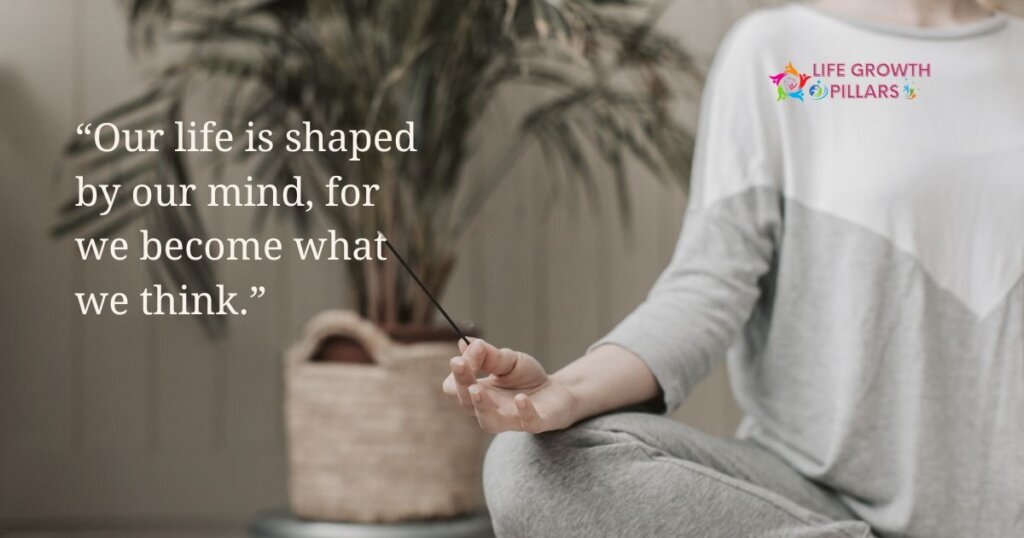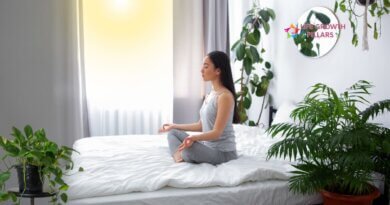Mindfulness Meditation For Anxiety: 10 Ways To Find Peace
Anxiety can be an overwhelming force, impacting various aspects of our lives. The constant worry, racing thoughts, and physical symptoms can make it challenging to navigate daily routines. However, there’s a powerful tool that can help manage anxiety effectively and that is mindfulness meditation for anxiety . In this comprehensive guide, we’ll explore ten actionable ways you can incorporate mindfulness meditation into your life to find peace amidst the storm of anxiety.

Benefits Of Mindfulness Meditation For Anxiety
Engaging in regular mindfulness meditation for anxiety offers a multitude of benefits for mental well-being. This practice helps individuals develop greater awareness of their thoughts and emotions, allowing them to respond to stressful situations with calmness and clarity. Research suggests that mindfulness meditation can reduce the symptoms of anxiety by promoting relaxation, enhancing emotional regulation, and fostering a sense of inner peace. By incorporating mindfulness meditation for anxiety into their daily routine, individuals can effectively manage anxiety and improve overall quality of life.
Understanding Mindfulness Meditation
Before diving into the techniques, let’s first grasp the essence of mindfulness meditation for anxiety . At its core, mindfulness involves being fully present in the moment, without judgment. It’s about observing thoughts and feelings without getting caught up in them. This practice cultivates awareness and acceptance, essential elements in managing anxiety.
1. Start With Breath Awareness
One of the simplest yet most potent mindfulness practices is breath awareness. Seek a haven of calm, settle comfortably, and embark on a journey inward with each breath. Notice the dance of air, filling and releasing tension. When your mind wanders (as it inevitably will), gently guide your focus back to your breath. This exercise trains the mind to stay present and calm, reducing anxiety symptoms.
2. Practice Body Scan Meditation
Body scan meditation involves systematically moving your attention through different parts of your body, from head to toe, while noticing any sensations without judgment. This practice promotes relaxation and helps release tension stored in the body, which often accompanies anxiety. Regular sessions can increase body awareness and decrease overall anxiety levels.
3. Embrace Walking Meditation
For those who struggle with sitting meditation, walking meditation offers a dynamic alternative. Take a leisurely stroll in a peaceful environment, paying attention to each step and the sensations in your body. Drink in the sights, let sounds wash over you, and breathe in the whispers of the world around you. Walking meditation combines physical activity with mindfulness, making it an excellent choice for anxiety relief.
4. Cultivate Gratitude Through Mindful Journaling
Gratitude has a profound impact on mental well-being, countering the negative effects of anxiety. Start a mindful journaling practice by reflecting on things you’re grateful for each day. This could be as simple as appreciating a beautiful sunset or expressing gratitude for supportive relationships. Writing down these moments of gratitude reinforces positive emotions and shifts focus away from anxiety.
5. Engage In Mindful Eating
Ditch the autopilot! Mindful eating means stopping to truly experience your food. Savor the rich aroma, delightful textures, and explosions of flavor with every bite. Let go of the rush and slow down, giving your full attention to each mouthful. Listen to your body, notice how different foods make you feel, and enjoy the nourishment on every level. By bringing awareness to eating habits, you can develop a healthier relationship with food and reduce stress-related eating.

6. Incorporate Mindfulness Into Daily Activities
You don’t have to set aside dedicated time for mindfulness practice; you can integrate it into your daily routine. Whether you’re washing dishes, brushing your teeth, or commuting to work, bring mindful awareness to the task at hand. This simple shift in perspective can turn mundane activities into opportunities for relaxation and stress reduction.
7. Find Support In Mindfulness Communities
Connecting with others who share an interest in mindfulness meditation for anxiety can provide valuable support and encouragement. Join local mindfulness groups, online forums, or meditation classes to engage with like-minded individuals. Sharing experiences and insights can enhance your practice and foster a sense of belonging, which is essential for managing anxiety.
8. Explore Guided Meditation
Guided meditation offers a structured approach to mindfulness practice, especially beneficial for beginners. You can find a plethora of guided meditation resources online, ranging from short sessions to longer recordings. Choose ones tailored to anxiety relief, focusing on relaxation techniques and soothing imagery. Allow the guide’s voice to lead you into a state of deep relaxation and tranquility.
9. Foster Self-Compassion
Anxiety often stems from self-criticism and unrealistic expectations. Practicing self-compassion involves treating yourself with kindness and understanding, especially during challenging moments and its a helpful tool for mindfulness meditation for anxiety . When anxiety arises, acknowledge your feelings without judgment and offer yourself words of comfort. Cultivating self-compassion fosters resilience and strengthens your ability to cope with anxiety.
10. Seek Professional Guidance
While mindfulness meditation can be a powerful tool for managing anxiety, it’s essential to recognize when professional help is needed. If anxiety significantly impacts your daily functioning or persists despite mindfulness practice, consider seeking support from a mental health professional. Therapists can provide personalized guidance and additional strategies to address underlying issues contributing to anxiety.

Conclusion
Incorporating mindfulness meditation into your life can significantly alleviate anxiety and enhance overall well-being. By practicing breath awareness, body scan meditation, and other mindfulness techniques, you can cultivate a greater sense of peace and resilience in the face of life’s challenges. Remember to approach mindfulness meditation for anxiety with patience and compassion, allowing yourself the time and space to explore its transformative potential. Start your journey towards inner peace today with mindfulness meditation.
Frequently Asked Questions
Q1. How long does it take to see results from mindfulness meditation for anxiety?
A. The time it takes to experience benefits from mindfulness meditation for anxiety can vary from person to person. Some individuals may notice improvements in their symptoms after just a few sessions, while others may require more time. Consistency and patience are key; regular practice over time tends to yield the most significant results.
Q2. Can mindfulness meditation replace medication for anxiety?
A. While mindfulness meditation can be a helpful tool in managing anxiety, it’s essential to consult with a healthcare professional regarding medication and treatment options. For some individuals, mindfulness meditation may complement medication or other therapies, while others may find it sufficient as a standalone practice. Personalized guidance from a healthcare provider can help determine the most appropriate approach for addressing anxiety.
Q3. Is mindfulness meditation suitable for everyone, regardless of their level of anxiety?
A. Mindfulness meditation is generally accessible to individuals of all levels of anxiety. However, it’s essential to approach the practice with self-compassion and patience, especially for those experiencing severe anxiety symptoms. Beginners may benefit from starting with shorter meditation sessions and gradually increasing duration as they become more comfortable with the practice.
Q4. Can mindfulness meditation worsen anxiety symptoms?
A. While rare, some individuals may experience temporary increases in anxiety when beginning a mindfulness meditation practice. This phenomenon, known as the “backlash effect,” typically occurs as suppressed emotions and thoughts surface during meditation. However, these initial challenges often subside with continued practice, leading to greater emotional resilience and decreased anxiety over time.
Q5. How often should I practice mindfulness meditation for anxiety?
A. The frequency of mindfulness meditation for anxiety practice can vary based on individual preferences and schedules. Ideally, aim for regular sessions, even if they’re brief, to maintain consistency and momentum in your practice. Starting with just a few minutes each day and gradually increasing duration as you become more comfortable can be a sustainable approach.
Q6. Can mindfulness meditation help prevent anxiety attacks?
A. While mindfulness meditation for anxiety may not completely prevent anxiety attacks, it can be a valuable tool for managing and reducing the frequency of episodes. By cultivating awareness of triggers and practicing relaxation techniques during meditation, individuals can develop coping strategies to navigate anxiety attacks more effectively and with less intensity.
Q7. Are there specific mindfulness meditation techniques recommended for anxiety relief?
A. Several mindfulness meditation for anxiety techniques are particularly beneficial for anxiety relief, including breath awareness, body scan meditation, and loving-kindness meditation. Experiment with different techniques to find what resonates best with you and incorporate them into your regular practice for optimal anxiety management.
Final Thoughts
Mindfulness meditation for anxiety offers a holistic approach to managing symptoms and promoting mental well-being. By incorporating mindfulness into daily life through practices such as breath awareness, body scan meditation, and mindful eating, individuals can cultivate greater resilience and inner peace in the face of anxiety. Remember that mindfulness is a journey, and progress may come gradually. Approach your practice with patience, self-compassion, and an open mind, and trust in the transformative power of mindfulness to alleviate anxiety and enhance overall quality of life. Start your journey towards greater peace and tranquillity today with mindfulness meditation.



